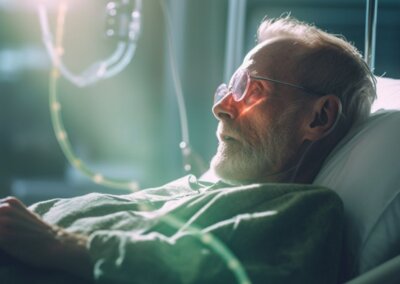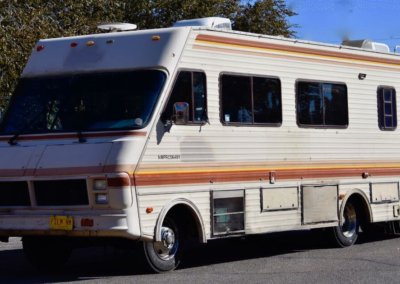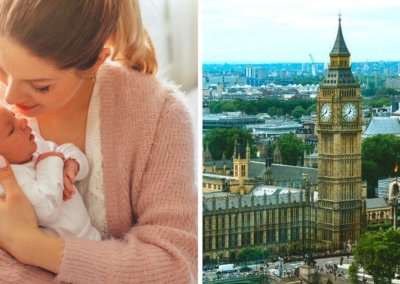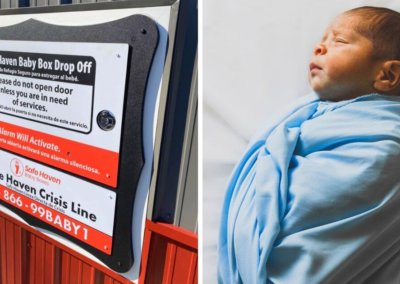The overturning of ‘Roe v Wade’ in the US has seen a renewed interest in safe haven laws, which are presented as an alternative to abortion. These laws permit women in difficult situations to give up their babies, anonymously, shortly after birth without prosecution.
The BBC has reported on the experiences of a mother who gave up her baby under a safe haven law, a nurse who advocates for their use after a baby was abandoned and died in a hospital in which she was working, and a boy who was given up as a baby.
”I think giving her up is going to be the best option”.
Michelle, a mother in Arizona, delivered her baby in her car. The only person she had with her was her toddler daughter.
“I was in so much pain – I couldn’t make it back to get to a hospital”, she said. Near a creek, 20 miles from town, Michelle gave birth in her car.
“It was scary. I remember just praying. I was calling out for my Mom… I wanted my Mom.”
Michelle was too frightened to tell anyone she was pregnant. The father of her toddler was unpredictable and she was no longer seeing the father of her new baby. But Michelle knew about Arizona’s safe haven laws and that she could anonymously give up her child without prosecution.
She drove to the nearest hospital where she stayed for less than three minutes.
“I asked to speak to [the staff at] labour and delivery. They came and talked to me and I told them ‘I think giving her up is going to be the best option’. I just wanted her to be safe – from my oldest daughter’s dad”.
She gave her baby to the nurses and knew that her child would now be adopted.
But Michelle changed her mind and decided she could not give up her baby. “I couldn’t get her face out of my head”, she has since said about her baby. Three days after giving her baby up, she called the National Safe Haven Alliance (NSHA), who managed to have her baby returned to her a month later.
“Most of the time the baby isn’t the crisis, it’s their situation”.
Heather Burner is the director of the Arizona Safe Haven programme and executive director of the National Safe Haven Alliance (NSHA) and, ten years ago, the death of a newborn baby propelled her to become an advocate for safe haven laws.
“A 15-year-old checked in, complaining of abdominal pain. After her vital signs were checked, she went to the bathroom. She delivered her baby by herself and put him in the garbage can. About 20 minutes later, a housekeeper found him. We tried to do life-saving efforts, but we were unsuccessful”, Heather said.
But the teenager denied the baby was hers despite all the evidence. “It was very traumatic”, says Heather.
She calculated 4,687 babies have been “surrendered” nationally since 1999. The NSHA runs a helpline that has seen a significant increase in calls since Roe v Wade was overturned. During June there was a 300% increase in calls.
When a woman calls “[w]e ask, what prevents you from parenting this child?” Heather said. “Most of the time the baby isn’t the crisis, it’s their situation. Are they homeless? Do they need child care? I’ve literally paid an electricity bill and it made the woman feel she could handle what was coming next.”
“Best Day Ever”
Porter Olson lives with his adoptive family in Arizona. He’s eleven and loves camping, gardening and cooking. His adoptive parents were contacted by the adoption agency in 2011.
Michael Olson, Porter’s father, said “I got the call, and they said we had a baby”. He then texted three words to his wife Nicole: “Best Day Ever”.
Porter had been left in a baby box by his birth mother at a hospital. In Arizona, an adoptive family is typically found on the same day. Like the Olsons, they might know next to nothing about their new baby.
“I never really minded that [we didn’t know anything about him] – I just figured we’d grow together and figure that part out”, says Nicole.
But even so, Nicole and Michael thought it might be good to know a little more.
“So one day my mum was going to get me a DNA test. Whatever I was, she was going to celebrate that”, said Porter. “And we got the test, and the doctor said, ‘Congratulations! You get to celebrate everything!’ I’m European, indigenous American, sub-Saharan African and East Asian”.
Safe haven laws were first introduced in Texas in 1999, then all other states followed.
Incidents of infanticide are highest on day of birth. A report by the US Centers for Disease Control and Prevention found the number of babies killed on the day fell by nearly 67% after safe haven laws.


![‘Safe haven baby boxes’ provide an alternative to abortion – a mum, a child and a nurse share their stories The overturning of ‘Roe v Wade’ in the US has seen a renewed interest in safe haven laws, which are presented as an alternative to abortion. These laws permit women in difficult situations to give up their babies, anonymously, shortly after birth without prosecution. The BBC has reported on the experiences of a mother who gave up her baby under a safe haven law, a nurse who advocates for their use after a baby was abandoned and died in a hospital in which she was working, and a boy who was given up as a baby. ”I think giving her up is going to be the best option”. Michelle, a mother in Arizona, delivered her baby in her car. The only person she had with her was her toddler daughter. “I was in so much pain - I couldn't make it back to get to a hospital”, she said. Near a creek, 20 miles from town, Michelle gave birth in her car. “It was scary. I remember just praying. I was calling out for my Mom… I wanted my Mom.” Michelle was too frightened to tell anyone she was pregnant. The father of her toddler was unpredictable and she was no longer seeing the father of her new baby. But Michelle knew about Arizona’s safe haven laws and that she could anonymously give up her child without prosecution. She drove to the nearest hospital where she stayed for less than three minutes. “I asked to speak to [the staff at] labour and delivery. They came and talked to me and I told them 'I think giving her up is going to be the best option’. I just wanted her to be safe - from my oldest daughter's dad”. She gave her baby to the nurses and knew that her child would now be adopted. But Michelle changed her mind and decided she could not give up her baby. "I couldn't get her face out of my head”, she has since said about her baby. Three days after giving her baby up, she called the National Safe Haven Alliance (NSHA), who managed to have her baby returned to her a month later. "Most of the time the baby isn't the crisis, it's their situation”. Heather Burner is the director of the Arizona Safe Haven programme and executive director of the National Safe Haven Alliance (NSHA) and, ten years ago, the death of a newborn baby propelled her to become an advocate for safe haven laws. “A 15-year-old checked in, complaining of abdominal pain. After her vital signs were checked, she went to the bathroom. She delivered her baby by herself and put him in the garbage can. About 20 minutes later, a housekeeper found him. We tried to do life-saving efforts, but we were unsuccessful”, Heather said. But the teenager denied the baby was hers despite all the evidence. "It was very traumatic", says Heather. She calculated 4,687 babies have been "surrendered" nationally since 1999. The NSHA runs a helpline that has seen a significant increase in calls since Roe v Wade was overturned. During June there was a 300% increase in calls. When a woman calls “[w]e ask, what prevents you from parenting this child?" Heather said. "Most of the time the baby isn't the crisis, it's their situation. Are they homeless? Do they need child care? I've literally paid an electricity bill and it made the woman feel she could handle what was coming next." “Best Day Ever” Porter Olson lives with his adoptive family in Arizona. He’s eleven and loves camping, gardening and cooking. His adoptive parents were contacted by the adoption agency in 2011. Michael Olson, Porter’s father, said “I got the call, and they said we had a baby”. He then texted three words to his wife Nicole: “Best Day Ever”. Porter had been left in a baby box by his birth mother at a hospital. In Arizona, an adoptive family is typically found on the same day. Like the Olsons, they might know next to nothing about their new baby. "I never really minded that [we didn’t know anything about him] - I just figured we'd grow together and figure that part out", says Nicole. But even so, Nicole and Michael thought it might be good to know a little more. “So one day my mum was going to get me a DNA test. Whatever I was, she was going to celebrate that”, said Porter. "And we got the test, and the doctor said, 'Congratulations! You get to celebrate everything!' I'm European, indigenous American, sub-Saharan African and East Asian”. Safe haven laws were first introduced in Texas in 1999, then all other states followed. Incidents of infanticide are highest on day of birth. A report by the US Centers for Disease Control and Prevention found the number of babies killed on the day fell by nearly 67% after safe haven laws.](https://righttolife.org.uk/wp-content/uploads/2022/11/‘Safe-haven-baby-boxes-provide-an-alternative-to-abortion-a-mum-a-child-and-a-nurse-share-their-stories.jpg)









